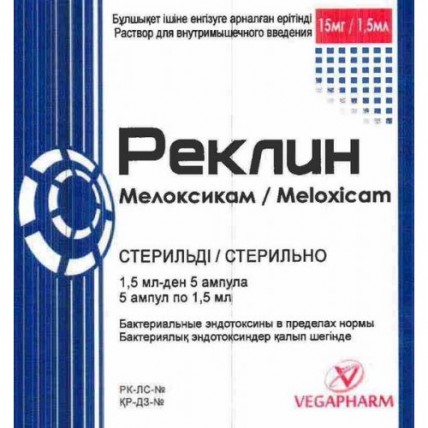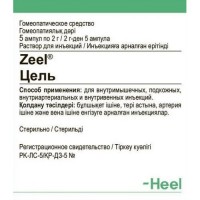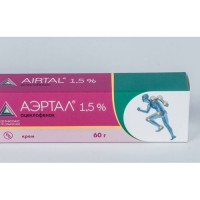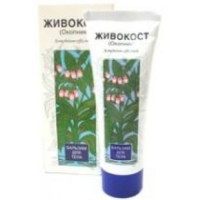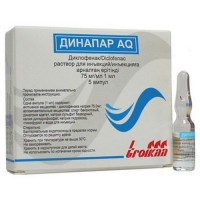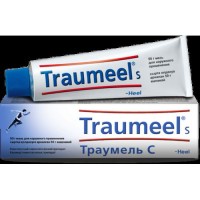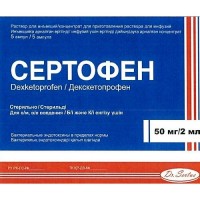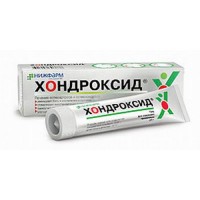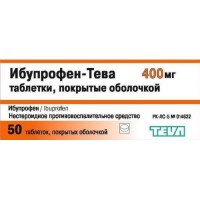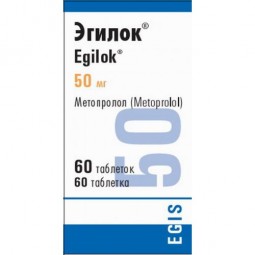Reklin 15 mg / 1.5 ml 5's solution for intramuscular administration
- $19.00
The instruction for medical use of Reklin Torgovoye medicine a name Reklin Mezhdunarodnoye the unlicensed name Meloksikam Lekarstvennaya a form Solution for intramuscular introduction of 15 mg / 1.5 ml, 1.5 ml Structure One ampoule contains active agent – to meloksika of 15 mg, excipients: Megluminum, glyukofurol, half-oxameasures 188, sodium chloride, glycine, sodium hydroxide, water for injections. Description Transparent solution of yellowish-greenish color Pharmacotherapeutic group Anti-inflammatory and antirheumatic drugs. Non-steroidal anti-inflammatory drugs. Oksikama. Meloksikam the ATX M01AC06 Code the Pharmacological Meloksikam Pharmacokinetics properties is completely absorbed after intramuscular introduction. The relative bioavailability in comparison with bioavailability at intake is nearly 100% therefore upon transition from a dose, injection on oral forms of selection, it is not required. After introduction of 15 mg of drug intramusculary the peak concentration in plasma making 1.6-1.8 mkg/ml is reached in 60-90 min. Meloksikam intensively contacts proteins of plasma (especially with albumine) – 99%. Passes through gistogematichesky barriers, gets into synovial fluid. Concentration in synovial fluid makes 50% of concentration in plasma. It is metabolized in a liver to inactive metabolites. It is removed through intestines and kidneys (approximately in an equal proportion), in an invariable look – 5% of a daily dose (through intestines). Elimination half-life varies from 13 to 25 hours after introduction. The general plasma clearance is 7-12 ml/min. The pharmacokinetics of special groups of patients the Liver or renal failure of weak or moderate degree of manifestation does not influence pharmacokinetics of a meloksikam. At a final stage of a renal failure the increase in volume of distribution can become the reason of higher concentrations of a free meloksikam in plasma therefore the daily dose of 7.5 mg cannot be exceeded. Decrease in linking of a meloksikam with proteins is observed at patients with a terminal renal failure. Elderly men have the pharmacokinetic parameters similar to parameters of young men. Elderly women have higher AUC values and longer elimination half-life in comparison with patients of young age. Reklin's pharmacodynamics – the non-steroidal anti-inflammatory drug (NPVS) of group of oksikam having anti-inflammatory, soothing and febrifugal effect. The mechanism of above-mentioned effects consists in Reklin's ability to inhibit biosynthesis of prostaglandins which are inflammation mediators. The mechanism of action is connected mainly with selection inhibition of cyclooxygenase-2 (TsOG-2) - the specific enzyme participating in development of processes of inflammation. It is considered that the inhibition of TsOG-2 provides therapeutic effect of NPVS whereas the inhibition of constantly present isoenzyme of TsOG-1 can be the cause of side effects from a stomach and kidneys. The selectivity of a meloksikam concerning TsOG-2 is confirmed in various test systems, both in vitro, and in vivo. Frequency of development of perforation in upper parts of the digestive tract (DT), ulcers and bleedings which are tied with use of a meloksikam was low and depended on drug dose size. Indications For initial and short-term symptomatic treatment in inflammatory and degenerative diseases of the joints which are followed by a pain syndrome including - a pseudorheumatism - an osteoarthrosis - the Route of administration and doses ankylosing a spondylarthritis the Adult: intramuscular introduction can be carried out only within 3-5 days (depending on weight of a state). For further treatment it is necessary to take other dosage forms of drug: tablets for intake or rectal candles. Undesirable effects can be minimized by use of a minimal effective dose and taking into account the minimum duration of time necessary for control of symptoms. The recommended dose of the drug Reklin makes 7.5 or 15 mg once a day (depending on intensity of pain and weight of inflammatory reaction). At insignificant or moderate depression of function of kidneys (the clearance of creatinine is reduced no more than by 25 ml/min. from norm) and also in cirrhosis in a stage of remission of dose adjustment it is not required. The maximum daily dose of the drug Reklin in ampoules for the patients with a heavy renal failure who are on a hemodialysis should not exceed 7.5 mg. The initial dose at patients with the increased risk of side effects makes 7.5 mg/days. Considering possible incompatibility, contents of ampoules should not be mixed in one syringe with other medicines! Administration of the drug Reklin is carried out by a deep intramuscular injection to an upper external part of a buttock (using an asepsis). At repeated injections the injection site needs to be changed. Before administration of drug it is necessary to be convinced that the needle did not enter a blood vessel. In severe pain during an injection the administration of drug needs to be stopped immediately. In case of existence of a prosthesis of a hip joint at the patient, it is necessary to inject on the other hand. Side effects Often: - anemia - dizziness, a headache - nausea, vomiting, an eructation, an abdominal pain, diarrhea, a constipation, a meteorism - rash, an itching - hypostases, puffiness in the injection site is not frequent: - a leukopenia, thrombocytopenia, an agranulocytosis - drowsiness, a ring in ears - heartbeat, increase in arterial blood pressure - stomatitis, an esophagitis, digestive tract erosive cankers, the concealed or obvious gastrointestinal hemorrhage - passing changes of indicators of function of a liver (increase in activity of transaminases or bilirubin) - a small tortoiseshell - changes of indicators of function of kidneys (increase in level of creatinine and/or urea in blood serum, an albuminuria, a hamaturia) - painful feelings, consolidation in the injection site Is rare: - an acute anaphylaxis, anaphylactoid reactions and other reactions of immediate hypersensitivity - emotional lability, insomnia and nightmares, confusion of consciousness, orientation disturbance, sonitus, vertigo, the feeling of rush of blood suits - disorders of vision, including illegibility of sight, emergence of a veil before eyes, conjunctivitis - acute development of an attack of bronchial asthma (at the predisposed patients having an allergy to aspirin or other NPVP) - perforation of digestive tract, gastritis, colitis - hepatitis - a toxic epidermal necrolysis, Stephens-Johnson's syndrome, a Quincke's disease, bullous dermatitis, a multiformny erythema, a photosensitization - an acute renal failure, interstitial nephrite, urination difficulty, including a sharp ischuria of the Contraindication - hypersensitivity to a meloksikam or other components of drug - hypersensitivity to acetylsalicylic acid and other non-steroidal anti-inflammatory drugs (existence in the anamnesis of symptoms of bronchial asthma, nasal polyps, a Quincke's disease, urticaria after prescribing of acetylsalicylic acid or other NPVS) - to the patients receiving anticoagulants (risk of developing an intramuscular hematoma) - erosive and ulcer changes mucous a stomach and duodenum/perforation (in a phase of aggravation or recently postponed) - nonspecific ulcer colitis in an aggravation phase, Crohn's disease - the profound liver failure, liver diseases in the acute stage - gastrointestinal bleeding, recently postponed cerebrovascular bleeding or system disturbances of blood clotting - the progressing disease of kidneys, the profound renal failure (if the hemodialysis is not carried out), clearance of creatinine less than 30 ml/min. - dekompensirovanny heart failure - a postoperative pain syndrome after aortocoronary shunting (imposing of a roundabout anastomosis) - children's and teenage age up to 18 years - pregnancy and the period of a lactation Medicinal interactions - Other inhibitors of synthesis of prostanglandin, including corticosteroids or salicylates: their co-administration is not recommended, in connection with increase in risk of development of an ulceration or gastrointestinal bleeding - oral anticoagulants, heparin, trombolitik: the increased risk of developing bleeding if it is not possible to avoid joint prescribing of drugs, it is necessary to control carefully effects of anticoagulants on coagulation - antiagregant and selective serotonin reuptake inhibitors: the increased risk of developing bleeding because of depression of function of thrombocytes - lities: NPVS increase lithium level in blood plasma, co-administration is not recommended. If it is not possible to avoid combined use, it is necessary to determine lithium level in plasma at the beginning and the end of treatment and also after change of a dose of the drug Reklin - a methotrexate: as well as other NPVS, Reklin can reduce tubular secretion of a methotrexate, enhancing its hematologic toxicity, co-administration is not recommended. If it is not possible to avoid combined use, monitoring of quantity of uniform elements of blood - contraceptives is necessary: there are messages that NPVS reduce efficiency of intrauterine contraceptives - diuretics: at treatment of NPVS there is potentiality of development of an acute renal failure in patients with dehydration. The patients taking the drug Reklin in combination with diuretics have to receive enough liquid, before therapy by Reklin it is necessary to investigate function of kidneys - antihypertensive drugs (e.g., beta-blockers, angiotensin-converting enzyme inhibitors, vazodilatator, diuretics): during treatment of NPVS the decrease in efficiency of antihypertensive drugs owing to blocking of prostaglandins-vazodilatatorov was noted - combined use of NPVS and antagonists of receptors of angiotensin II (also as well as APF inhibitors) enhances effect of decrease in glomerular filtration, at patients with a renal failure it can lead to development of an acute renal failure - holestiramin accelerates elimination of a meloksikam by interruption of hepatoenteric recirculation in such a way that the clearance of a meloksikam increases by 50%, and elimination half-life decreases till 13+3 o'clock, this interaction has the clinical importance - cyclosporines: NPVS can increase indirectly through renal prostaglandins nephrotoxicity of cyclosporines, during joint prescribing of these drugs it is necessary to exercise control of function of kidneys - the possibility of medicinal interactions with oral antidiabetic means is not excluded - NPVS can cause a delay of sodium, potassium, liquid and to weaken effect of saluretics. As a result, at predisposed patients the purpose of NPVS can lead to progressing of heart failure and hypertensia. No pharmacokinetic medicinal interactions were revealed at co-administration of a meloksikam and antacids, Cimetidinum, digoxin, furosemide. Special instructions Reklin, solution for injections is not intended for intravenous administration! Before prescribing of the drug Reklin it is necessary to make sure of absence of an esophagitis, gastritis and/or round ulcer. It is necessary to watch that the patients accepting to meloksika had no recurrence of these diseases. As well as other NPVS, it is necessary to apply it with care at patients with diseases of the upper parts of a GIT and also at patients receiving anticoagulating therapy. Development of an ulcer, gastrointestinal bleeding or perforation can proceed with symptoms - harbingers and without them. In case of development of a round ulcer or gastrointestinal bleeding the drug Reklin has to be cancelled. Gastrointestinal bleeding, an ulcer and perforation can potentially lead to heavy and even lethal outcome, especially at people of advanced age. Special attention needs to be paid to patients at whom undesirable effects from skin developed and mucous, in such cases it is necessary to consider a question of the termination of administration of drug Reklin. NPVS, including Reklin, inhibit synthesis of renal prostaglandins which participate in maintenance of sufficient level of a renal blood-groove. Purpose of NPVS, to patients with a reduced renal blood-groove and volume of the circulating blood can accelerate process of a decompensation of function of kidneys, however, after cancellation of therapy of NPVS, function of kidneys is usually restored to the previous level. Risk of development of similar reactions at patients with dehydration phenomena, with stagnant heart failure, cirrhosis, a nephrotic syndrome and a serious illness of kidneys, at the patients who are receiving diuretics and also transferred the extensive surgery which led to a hypovolemia is especially big. At such patients from the very beginning of treatment it is necessary to exercise careful control of a diuresis and function of kidneys. In rare instances the drug Reklin, as well as other NPVS can cause interstitial nephrite, a glomerulonephritis, necrosis of marrow of kidneys or a nephrotic syndrome. It was in rare instances reported about increase in level of serumal transaminases or change of other indicators characterizing function of a liver, in most of them the aberrations were passing and insignificant. The dose decline of drug is not required from patients with clinically not progressing cirrhosis. If aberrations are expressed or have constant character, it is necessary to stop administration of the drug Reklin and to conduct control laboratory researches. At the patients receiving Reklin the development of a cytopenia is possible, the contributing factor is simultaneous use of potentially myelotoxic medicines, in particular a methotrexate. Isolated cases of an agranulocytosis at patients who accepted to meloksika and other potentially myelotoxic medicines were observed. The weakened and exhausted patients can transfer side effects heavier, for such patients the careful observation is necessary. As well as it is necessary to use other NPVS, the drug Reklin with care at elderly patients at whom function of kidneys, a liver or heart is more often broken. Reklin can promote a delay of sodium, potassium and water and to weaken natriuretic effect of diuretics. As a result in the presence of the contributing factors, prescribing of drug can lead to progressing of heart failure and hypertensia. Therefore at patients of risk group it is necessary to carry out clinical observation. As well as other NPVS, the drug Reklin can mask symptoms of infectious diseases. The recommended maximum daily dose cannot be exceeded in case of insufficient therapeutic effect, and it is impossible to add other NPVP as they can increase toxicity of these drugs whereas the therapeutic advantage of their combined use is not proved to this treatment. In case of lack of improvement within several days of use, it is necessary to carry out correction of the carried-out therapy. As well as at introduction of other NPVP for intramuscular introduction, in the place of an injection the abscess or necrosis can be formed. The fertility Use of a meloksikam, as well as other drugs inhibiting cyclooxygenase/prostaglandin synthesis - can reduce fertility, and it is not recommended to the women planning pregnancy. Meloksikam can detain an ovulation. Therefore, to women with pregnancy approach difficulty and also to the women undergoing inspection concerning infertility, it is necessary to stop reception of a meloksikam. Pregnancy. Within the last three months of pregnancy all inhibitors of synthesis of prostaglandin can render on a fruit cardiopulmonary (a pulmonary hypertension with premature closing of an arterial channel) and renal toxic action or can suppress sokratitelny ability of a uterus. This action on a uterus caused increase in frequency of a diskoordination of patrimonial activity and overdue childbirth in animals. Lactation. Meloksikam is allocated with mother's milk therefore drug is contraindicated to nursing mothers. Features of influence of medicine on ability to run the vehicle or potentially dangerous mechanisms At emergence such collateral f
ekt as disturbance of visual acuity, dizziness or drowsiness, is recommended to refuse such types of activity as driving or work with the machine equipment. Overdose Symptoms: nausea, vomiting, abdominal pain, strengthening of other side effects of drug. Treatment: symptomatic. There are no specific antidotes. During clinical trials it was revealed that holestiramin accelerates removal of a meloksikam. A form of release and packing On 1.5 ml in ampoules of colourless glass. On 5 ampoules together with the instruction for use in the state and Russian languages place in a plastic pallet and put Storage conditions in a cardboard box to Store in the place protected from light at a temperature not above 25 °C. To store out of children's reach! Not to use a period of storage of 5 years after an expiration date. Prescription status According to the prescription Producer Help S.A., Attica, Greece the Owner of the registration certificate of Vegapharm LLP., London, Great Britain the Address of the organization accepting claims from consumers on quality of products in the territory of the Republic of Kazakhstan: Representative office of Cepheus Medical LLP (Tsefey Medikal): 050000, Republic of Kazakhstan, Almaty, Panfilov St. 98, BC OLD SQUARE, office 807
to Develop
ekt as disturbance of visual acuity, dizziness or drowsiness, is recommended to refuse such types of activity as driving or work with the machine equipment. Overdose Symptoms: nausea, vomiting, abdominal pain, strengthening of other side effects of drug. Treatment: symptomatic. There are no specific antidotes. During clinical trials it was revealed that holestiramin accelerates removal of a meloksikam. A form of release and packing On 1.5 ml in ampoules of colourless glass. On 5 ampoules together with the instruction for use in the state and Russian languages place in a plastic pallet and put Storage conditions in a cardboard box to Store in the place protected from light at a temperature not above 25 °C. To store out of children's reach! Not to use a period of storage of 5 years after an expiration date. Prescription status According to the prescription Producer Help S.A., Attica, Greece the Owner of the registration certificate of Vegapharm LLP., London, Great Britain the Address of the organization accepting claims from consumers on quality of products in the territory of the Republic of Kazakhstan: Representative office of Cepheus Medical LLP (Tsefey Medikal): 050000, Republic of Kazakhstan, Almaty, Panfilov St. 98, BC OLD SQUARE, office 807
to Develop
